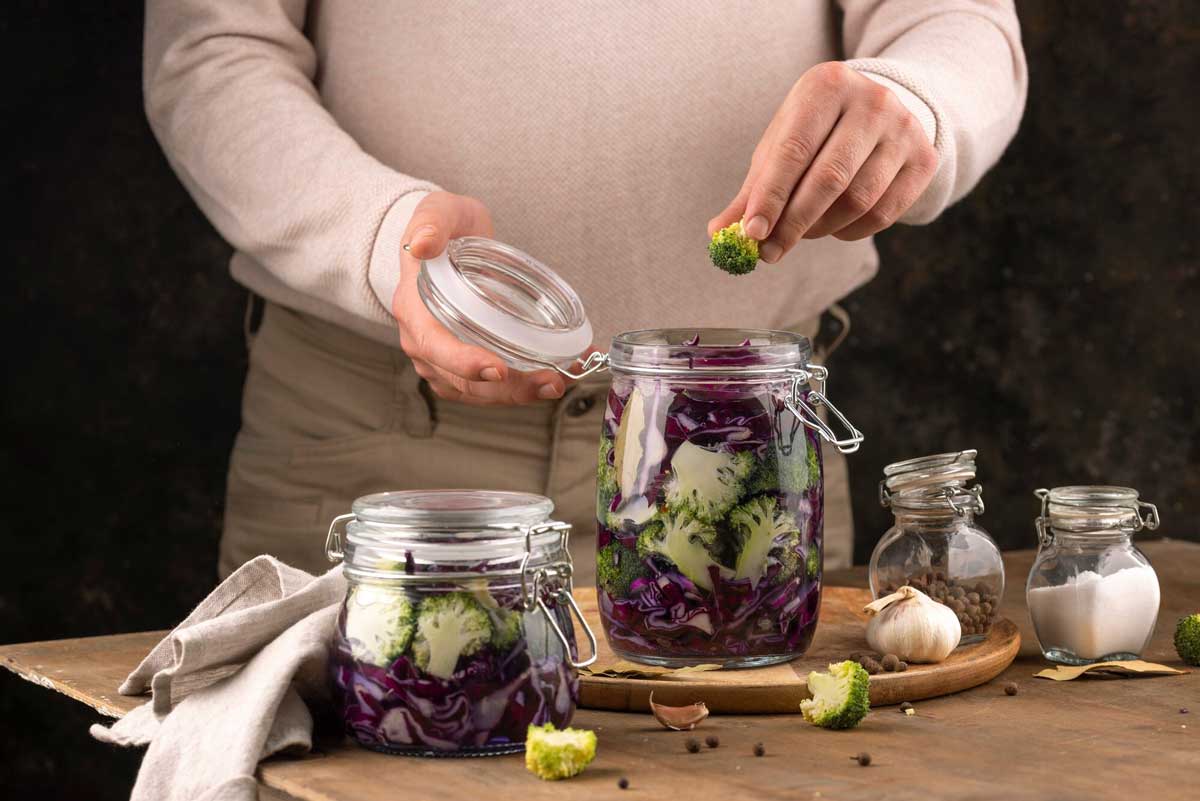Did you know that what you eat could be the key to unlocking better mental health? It’s true! In recent years, researchers have been uncovering fascinating connections between our gut and our brain. And at the forefront of this exciting field are fermented foods and their mental health benefits. These tangy, probiotic-rich delights aren’t just tasty – they might be your new secret weapon for battling the blues and boosting your mood. In fact, a 2021 study published in the journal Cell found that a diet high in fermented foods increased microbiome diversity and decreased markers of inflammation. So, let’s dive into the world of fermented foods and explore how they can revolutionise your mental well-being!
Understanding the Gut-Brain Connection
Have you ever had a “gut feeling” about something? Well, it turns out there’s more to that phrase than you might think! The gut-brain connection, also known as the gut-brain axis, is a fascinating area of research that’s shedding light on how our digestive system and our mental health are intricately linked.
So, how does this work? Imagine a superhighway of communication between your gut and your brain. This highway is made up of nerves, hormones, and other biochemical signals that are constantly sending messages back and forth. It’s like your gut and brain are having a non-stop conversation!
One of the key players in this conversation is your gut microbiome – the trillions of bacteria that call your digestive system home. These tiny microbes aren’t just passive passengers; they’re actively influencing your mood and mental state. Isn’t that wild?
But wait, there’s more! Inflammation in the gut can also impact your mental health. It’s like when your gut is irritated, it sends distress signals to your brain, potentially contributing to mood disorders. And here’s another fun fact: did you know that a significant portion of your body’s neurotransmitters, including serotonin (often called the “happy hormone”), are actually produced in your gut? It’s true!

Fermented Foods: Nature’s Probiotic Powerhouses
Now that we understand the gut-brain connection, let’s talk about a delicious way to support it: fermented foods! But what exactly are fermented foods?
Fermented foods are those that have undergone a process where natural bacteria feed on the sugar and starch in the food, creating lactic acid. This process preserves the food and creates beneficial enzymes, B-vitamins, and various strains of probiotics. Some common examples include yogurt, kefir, sauerkraut, kimchi, and kombucha. Sounds yummy, right?
The fermentation process is like a natural alchemy, transforming ordinary foods into probiotic powerhouses. Not only does it extend the shelf life of foods, but it also enhances their nutritional profile. Fermented foods are often rich in vitamins B and K2, and they can even make minerals more bioavailable.
But not all fermented foods are created equal when it comes to probiotic content. For instance, yogurt typically contains a few strains of probiotics, while kefir can have up to 30 different strains! Kimchi and sauerkraut are also probiotic superstars, packed with beneficial bacteria.

The Science Behind Fermented Foods and Mental Health
You might be wondering, “This all sounds great, but where’s the proof?” Well, science has been busy investigating the link between fermented foods and mental health, and the results are pretty exciting!
Recent studies have shown that regular consumption of fermented foods can lead to improvements in various aspects of mental health. For example, some research suggests that fermented foods may help reduce symptoms of anxiety and depression. Isn’t that amazing?
Stress is another area where fermented foods seem to shine. Some studies have found that people who regularly consume fermented foods report lower levels of perceived stress. It’s like these foods are nature’s chill pill!
But how exactly do fermented foods work their magic on our mood? Scientists believe it’s a combination of factors, including the beneficial bacteria supporting our gut health, the reduction of inflammation, and the production of mood-regulating neurotransmitters in the gut.

Incorporating Fermented Foods into Your Diet
So, you’re convinced about the benefits of fermented foods and want to add them to your diet. Great! But where do you start?
Adding fermented foods to your meals can be easier than you might think. Why not start your day with a bowl of yogurt topped with berries? Or add a spoonful of sauerkraut to your lunchtime sandwich? Kombucha can make for a refreshing afternoon drink, and kimchi can add a spicy kick to your dinner.
As for how much you should eat, most experts recommend consuming a small amount of fermented foods daily for optimal benefits. Think of it as a daily dose of good bacteria for your gut!
However, it’s important to note that while fermented foods are generally safe for most people, some individuals might experience bloating or digestive discomfort when first introducing these foods. If you have a compromised immune system or certain health conditions, it’s always best to consult with your healthcare provider first.
Feeling adventurous? Why not try making your own fermented foods at home? It’s easier than you might think and can be a fun and rewarding process!

Beyond Fermentation: Other Dietary Strategies for Mental Well-being
While fermented foods are fantastic for mental health, they’re not the only dietary strategy we can use. Let’s explore some other ways to eat for better mental well-being.
Omega-3 fatty acids, found in fatty fish, walnuts, and flaxseeds, are like brain food. They support cognitive function and may help reduce symptoms of depression. So why not add some salmon to your meal plan?
A diverse, plant-based diet is another great strategy. The more varied the plants on your plate, the more diverse your gut microbiome will be. And remember, a happy gut often means a happy mind!
Here’s something you might not have considered: reducing sugar and processed foods can have a significant impact on your mental health. These foods can cause inflammation and mood swings, so cutting back could help stabilize your mood.
Lastly, have you heard about the potential benefits of intermittent fasting for brain function? Some research suggests that giving your digestive system regular breaks could support brain health. Of course, this approach isn’t for everyone, so it’s always best to consult with a healthcare professional before making significant changes to your eating patterns.
Conclusion
As we’ve explored, the connection between fermented foods and mental health is more than just a passing trend – it’s backed by science and holds incredible promise for our overall well-being. By incorporating these probiotic-rich foods into our diets, we’re not just nourishing our bodies, but potentially transforming our minds. Remember, small changes can lead to big results. So why not start your journey to better mental health today with a delicious serving of kimchi or a refreshing glass of kombucha? Your gut – and your brain – will thank you!




